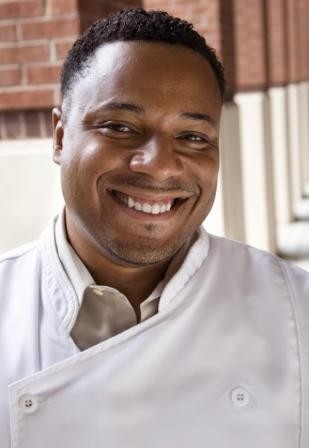Jun
28

Posted by randerson on June 28th, 2023
Posted in: Blog, NEC Profile
Chef Alex Askew knew that food insecurity often meant fresh vegetables weren’t on the daily menu of those he was about to serve.
“We decided to buy an air fryer and make okra,” he recalled. “The problem was, I only got the chance to eat a single piece, because everyone loved it so much.”
The all spice, thyme, butternut squash soup? Devoured.
 “Everything we did for that final meal was basically vegetarian. And we offered some techniques that didn’t involve frying everything in oil,” says Askew, who recently completed a two-year pilot program to build community relationships and increase food literacy in the U.S. Virgin Islands. Askew was funded as a subawardee of Region 2 of the Network of the National Library of Medicine.
“Everything we did for that final meal was basically vegetarian. And we offered some techniques that didn’t involve frying everything in oil,” says Askew, who recently completed a two-year pilot program to build community relationships and increase food literacy in the U.S. Virgin Islands. Askew was funded as a subawardee of Region 2 of the Network of the National Library of Medicine.
The commencement meal even included turning a staple of the Virgin Islands — fried dough balls known as Benyes — into a cookie that maintained the flavor profile while cutting the calories.
“Alex applied for funding our first grant year, and the notion of working to expand health literacy and mindful eating throughout the Virgin Islands was one that we decided to fund for two years,” says Lorin Jackson, MA, MI, Executive Director of NNLM Region 2, which includes Alabama, Florida, Georgia, Mississippi, South Carolina, Tennessee, Puerto Rico, and the U.S. Virgin Islands. The Medical University of South Carolina Libraries serves as the Regional Medical Library for the region.
Askew’s project, Mindful Eating for the Beloved Community, is a program that started with a book of essays six years ago. The goal was to tell the stories of not only what is broken in the food system, but how to address correcting and rebuilding a food system that works, especially for the most vulnerable. (Watch NNLM video on Askew’s work)
Historically, the U.S. Virgin Islands has imported 98 percent of its food while having to contend with natural disasters like hurricanes and drought. The population has suffered from food insecurity and elements of social determinants of health, including economic stability, access to education, access to healthcare, the built environment, and community context.
“The notion of mindful eating is really taking that sense of awareness; where our food comes from, how it is grown. When you import food from four to five weeks away, you have to eat it almost immediately,” says Askew. “Once we are aware of issues, we can start thinking of ways to create a better food system, to raise awareness around neighborhood initiatives, and focusing on the beloved community.”
One goal of the project was to create a space to come together as a community and use food as a bond — to break bread together — and discuss what things are healthy and not healthy, what should be a treat, and how can individuals make small changes to add years to their life.
Askew worked with 25 ambassadors who committed their time, enthusiasm, and commitment to learning about the elements of Mindful Eating for the Beloved Community to foster themselves as Community Health Ambassadors.
“The students and the adults who comprise this group showed a very high commitment to helping their community and uplifting their community in terms of wellness, and I’d like to applaud them,” Askew says. “It was also awesome to collaborate with Region 2 as we managed to clear hurdles and obstacles as they came along and had constant communication to look at how we could analyze and navigate to have the most success in the program.”
Following the program, Askew utilized the National Evaluation. Center Participant Activity Survey (PAS) to collect the evidence-based data necessary to ask and. assess the learning outcomes of the program.
“The PAS was very, very easy to use and user-friendly. It was straightforward and I would recommend it to future subawardees.”
The NNLM PAS is a standard, online, anonymous survey that collects process improvement data from any participant in non-training activities across the NNLM. The PAS can be used by ROC staff but also by NNLM subawardees for their own activities (as part of their grant’s evaluation plan). In a conscious effort for increasing accessibility, the survey is offered in two languages (Spanish and English). Similarly, following ROC feedback, the PAS offers the opportunity to customize learning objectives for evaluation purposes.
“Moving forward, we would like to replicate the success of this program in other regions that have the same type of need, like in the Southeast region of the United States and especially Puerto Rico.,” says Askew.
Askew sees libraries as beacons within many communities and he hopes to identify libraries that would be interested in creating pilot programming.
“Our goal is to open people up to different options and bring someone something like a vegetable soup and hear that they could eat it every day,” he says. “Those are the kind of changes that start with the individual impact and expand to the community. You can roast instead of fry. It’s not going to be the way your grandmother did it, but we need to adjust using smart cooking methods and herbs and spices and incorporate fruits and vegetable to live more mindful and healthy lives.”
Written by Roger Anderson